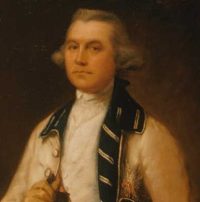On the morning of the twenty-fourth, we sent an ineffectual summons to the town, and, with the Admiral and other principal officers, examined the coast, in order to fix upon a proper spot for landing the troops, artillery, and stores. We found a most convenient place about two miles to the south of Manila. Accordingly, all the boats were immediately prepared by the proper signals: and three frigates, the Argo, Capt. King; Seahorse, Capt. Grant; and Seaford, Capt. Peighin, were sent in very near the shore to cover the descent. The 79th regiment, the marines, a detachment of artillery, with three field-pieces, and one howitzer, fixed in the long-boats, assembled in three divisions under their sterns; the left, commanded by Col. Morison, quartermaster general; the centre by me, with Lt-Col. Scott the adjutant-general; the right by Maj. More, the eldest field officer. As we had determined to land near a church and village called Malata, that was opposite our left, the other two divisions, which had been separated only to amuse and distract the attention of the enemy, were ordered to join that as soon as possible. About six in the evening we pushed, with an even front, for the shore, under the prudent and skilful management of the Captains Parker of the Grafton, Kempenfelt the Admiral’s captain, and Brereton of the Falmouth, who had the direction of the boats. The frigates kept up a brisk fire to the right and left of us, to protect our flanks, and disperse the enemy, who were beginning to assemble in great numbers both horse and foot, to oppose our descent. This cannonade had the desired effect. They retired, and left us a clear coast. But a violent surf arose, many boats were dashed to pieces, our arms and ammunition much damaged; providentially no lives were lost. We formed upon the beach, marched, and took possession of the Malata, fixed our outposts, and passed the whole night under arms. The Spaniards were employed in burning part of their suburbs.
